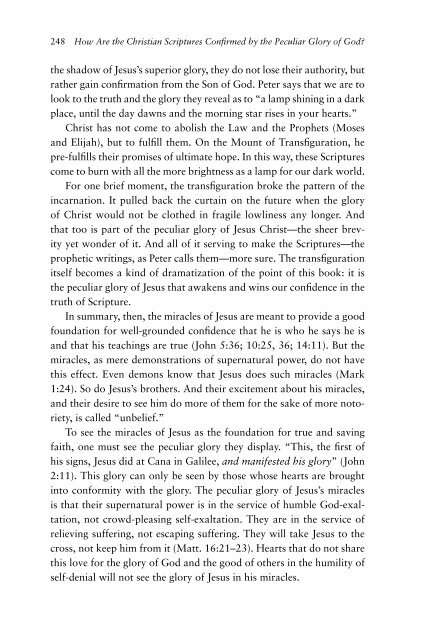Scriptures selfattesting authority question doctrine truthfulness Scriptures
peculiar-glory-en
peculiar-glory-en
Create successful ePaper yourself
Turn your PDF publications into a flip-book with our unique Google optimized e-Paper software.
248 How Are the Christian <strong>Scriptures</strong> Confirmed by the Peculiar Glory of God?<br />
the shadow of Jesus’s superior glory, they do not lose their <strong>authority</strong>, but<br />
rather gain confirmation from the Son of God. Peter says that we are to<br />
look to the truth and the glory they reveal as to “a lamp shining in a dark<br />
place, until the day dawns and the morning star rises in your hearts.”<br />
Christ has not come to abolish the Law and the Prophets (Moses<br />
and Elijah), but to fulfill them. On the Mount of Transfiguration, he<br />
pre-fulfills their promises of ultimate hope. In this way, these <strong>Scriptures</strong><br />
come to burn with all the more brightness as a lamp for our dark world.<br />
For one brief moment, the transfiguration broke the pattern of the<br />
incarnation. It pulled back the curtain on the future when the glory<br />
of Christ would not be clothed in fragile lowliness any longer. And<br />
that too is part of the peculiar glory of Jesus Christ—the sheer brevity<br />
yet wonder of it. And all of it serving to make the <strong>Scriptures</strong>—the<br />
prophetic writings, as Peter calls them—more sure. The transfiguration<br />
itself becomes a kind of dramatization of the point of this book: it is<br />
the peculiar glory of Jesus that awakens and wins our confidence in the<br />
truth of Scripture.<br />
In summary, then, the miracles of Jesus are meant to provide a good<br />
foundation for well-grounded confidence that he is who he says he is<br />
and that his teachings are true (John 5:36; 10:25, 36; 14:11). But the<br />
miracles, as mere demonstrations of supernatural power, do not have<br />
this effect. Even demons know that Jesus does such miracles (Mark<br />
1:24). So do Jesus’s brothers. And their excitement about his miracles,<br />
and their desire to see him do more of them for the sake of more notoriety,<br />
is called “unbelief.”<br />
To see the miracles of Jesus as the foundation for true and saving<br />
faith, one must see the peculiar glory they display. “This, the first of<br />
his signs, Jesus did at Cana in Galilee, and manifested his glory” (John<br />
2:11). This glory can only be seen by those whose hearts are brought<br />
into conformity with the glory. The peculiar glory of Jesus’s miracles<br />
is that their supernatural power is in the service of humble God-exaltation,<br />
not crowd-pleasing self-exaltation. They are in the service of<br />
relieving suffering, not escaping suffering. They will take Jesus to the<br />
cross, not keep him from it (Matt. 16:21–23). Hearts that do not share<br />
this love for the glory of God and the good of others in the humility of<br />
self-denial will not see the glory of Jesus in his miracles.


